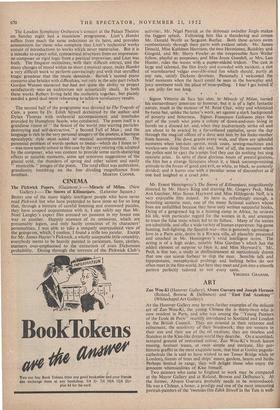CINEMA
The Pickwick Papers. (Gaumont.) Miracle of Milan. (New
Gallery.)—The Snows of Kilimanjaro. (Leicester Square.) BEING one of the many highly intelligent people who have never read Pickwick but who have pretended to have done so for so long that, through a mixture of careful listening and crossword puzzles, they have scraped acquaintance with it, 1 can safely say that Mr. Noel Langley's expert film aroused no passions in my breast one way or another. Happily unaware of its omissions, which are presumably legion, and only hazily conscious of its characters' personalities, I was able to take a uniquely unprejudiced view of the goings-on, which, I confess, 1 found a trifle too jocular. Except for Mr. James Hayter's Pickwick, a wholly acceptable little rotundity, everybody seems to be heavily painted in caricature, faces, clothes, manners over-emphasised to the extinction of even Dickensian probability. Diving through the torrents of the Pickwick Club's activities, Mr. Nigel Patrick as the debonair swindler Jingle makes the biggest splash. Following him like a thundering seal comes Mr. Donald Wolfit as Sergeant . Buzfuz. Both these actors swim rumbustiously through their parts with evident relish. Mr. James Donald, Miss Kathleen Harrison; the 'two Hermiones, Baddeley and Gingold, and Mr. Harry Fowler as the irrepressible Sam Weller follow, playful as porpoises, and Miss Joyce Grenfell, as Mrs. Leo Hunter, rules the waves with a papier-mache trident. The cast is large and talented, the film lively and crowded with incident, a riot of warmhearted vulgar over-life-sized fun which should, partly at any rate, satisfy Dickens devotees. Personally. 1' welcomed the brief moments when the heart could be seen in the horseplay and juicy sentiment took the place of nose-pulling. 1 fear 1 get bored if I am jolly for too long.
* * *• *
Signor Vittorio de Sica has also, in Miracle of Milan, turned his extraordinary attention to humour, but it is of a light fantastic nature, much in the manner of M. Rene Clair, witty and whimsical by turns but, unlike the latter's work, set against-a stark background of poverty and bitterness. Signor. Francesco Golisano plays the part of the youth who joins a colony of down-and-outs living in hovels on a disused lot, and, when they inadvertently strike oil and are about to be evicted by a fur-collared capitalist, saves the day through the magical offices of a dove sent him by his foster-mother from heaven. The dove grants every wish, and there are splendid moments when top-hats sprout, mink coats, sewing-machines and wireless-sets drop from the sky and, best of all, the moment when the police sent to eject the tramps find they can do nothing but sing operatic arias. In spite of these glorious bouts of prestidigitation, the film has a strange fierceness about it, a bleak uncompromising attitude to the forces of good and evil, so white, so black, so austerely divided; and it leaves one with a peculiar sense of discomfort as if one had laughed at a cruel joke.
Mr. Ernest Hemingway's The Snows of Kilimanjaro, magnificently directed by Mr. Henry King and starring Mr. Gregory Peck, Miss Ava Gardner, Miss Susan Hayward and Miss Hildegarde Neff, is -a very enjoyable film indeed. Its hero is, refreshingly enough, a brooding sarcastic man, one of the many fictional authors whose lives are unfulfilled because they have only written successful books. Dying of a gangrened leg in a hunting camp in Africa, he reviews his life, with particular regard for the women in it, and attempts to trace the false steps which led to its failure. Many of the scenes are admirable, and offer a wide variety of human experience: big-game hunting, bull-fighting, the Spanish war—this is genuinely agonising— love in a Paris attic, desire in a Riviera villa, all plausibly presented and couched in Mr. Hemingway's vivid intelligent terms. The acting is of a high order, notably Miss Gardner's which has the added element of surprise to bless it, and Miss Hayward's. Mr. Peck. is fine too, a study in disillusionment so meticulously drawn that one can scarce forbear to slap the man. Sensible talk and hippopotami, metaphysical probings and bathing belles do not often meet in the film-world, but here they meet and join into a smooth pattern perfectly tailored to suit every taste.
VIRGINIA GRAHAM.










































































 Previous page
Previous page